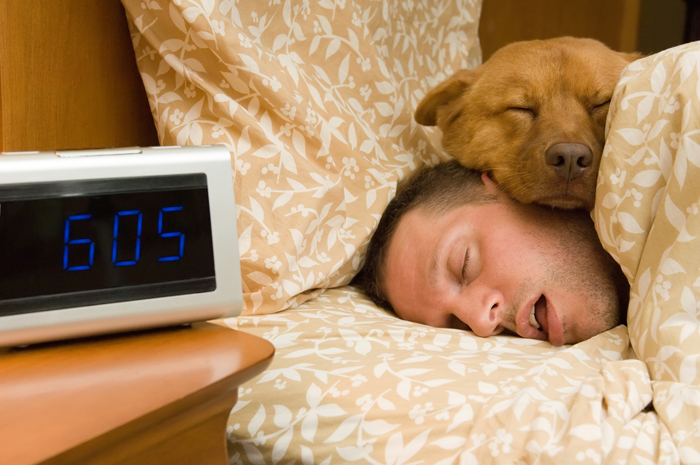The pros and cons of sharing mattress space with your canine companion.

Humanization of dogs is on the rise in modern society, and that means more pets share our amenities (and our bedrooms). If you’re one of the millions who allows a pet to sleep on (or in) your bed, you know it can become challenging. Here are a few of the pros and cons of letting your dog sleep with you. Not surprisingly, 43 percent of owners allow their dogs to sleep in their bed, according to a report from the American Pet Products Association. (Other studies report 60 to 80 percent of dogs share a bed with their owner at night.) No matter where you lie on the subject of sharing your bed with your dogs, there are pros and cons to both sides. On the benefits side, dogs are known for reducing stress in humans. They offer comfort and can actually help reduce symptoms of various conditions, such as rheumatoid arthritis (RA). The extra body heat they put out can help warm muscles and relieve swelling, and their mere presence can help lower your heart rate.

What, exactly, could possibly be wrong with dogs sharing your bed? Well, there are other health issues you need to consider; the most dangerous being parasites. Obviously, fleas and ticks can create many issues for people and pets. From West Nile virus to Lyme disease, it’s important to keep your pets pest-free. Some trainers believe that sharing your bed with your pet can cause behavior problems (although these trainers tend to fall into the “old-fashioned” school of training). Studies tend to back that up. There is a class of behavior known as “status-related aggression.” It can best be defined as aggression that results from a dog’s response to their owner. Occasionally, this aggression can be a problem for a spouse (although a marriage counselor may also be called for at that point) or a child who climbs into her parent’s bed in the wee hours of morning. Can letting your dog sleep in the bed increase your risk of being bitten? Perhaps. The important thing is to assess each case individually. If a dog begins to act in a possessive manner, it might be time to revoke bed privileges. Other problems might arise as well. For example, heat exhaustion. If you’re anything like me, you allow your pets to sleep in your room and in the deserts of the southwest, that means I have to put up with a lot of body heat. In the summers, I can promise you that one of us is getting on the couch due to heat exhaustion. You’ll also have to take into consideration the amount of sleep you’re actually getting. If you, your human partner or your pets are restless sleepers, you can be assured that your rest will be disrupted regularly.

Is sleeping with your dog a risk? Sure, but not much more of a risk than sleeping with another human. In the end, you have to do what is right for you and your pets. If you do choose to share your sleeping time with a dog (or dogs), you should make sure he or she (or they) is free from pests, that his/her nails are regularly trimmed, and that he/she share your sleeping habits. Like everything else, it’s ultimately up to you how you live your life. Personally, I’ll take a few minutes less sleep and a very slight possibility of being bitten to have the comfort and security of knowing my dogs are near me late at night. It’s a small price to pay for the many health benefits and feeling of security. What are your thoughts on sharing your bed with your pets?
About the Author: Stacy Mantle is the founder of PetsWeekly.com and the bestselling author of “Shepherd’s Moon.” Learn more great tips for living with animals by visiting PetsWeekly.com or get to know a little more about the author at www.StacyMantle.com





